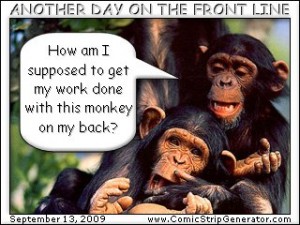Who Is Accountable for “The Customer Experience”? Maybe Not Who You Think
By Michelle Malay Carter on September 13, 2009
 Customer Experience Surveys
Customer Experience Surveys
As an add on to my thoughts about scapegoat syndrome, I wanted to add a caution around data derived from customer experience surveys.? Are you measuring what you think you are measuring with these surveys?
As Much about Systems as Customer Service
When you ask a customer how their experience with your organization was, you are measuring the quality of your systems as much as you are measuring your front line employees’ effectiveness.?
Measure, Measure, Measure
Measures are great, but they do not tell the whole story.? In our rush to quantify everything, some organizations are putting monkeys on the backs of the front employees that aren’t theirs to carry.
For What is the Front Line Employee Accountable?
Generally the front line employee is to deliver a service as trained within the policies set up by management.? They are to balance their pace and quality while maintaining a positive demeanor.
For What is the Front Line Employees NOT Accountable? (Note the Longer List)
- The quality and comprehensiveness of the training they receive
- Their level of empowerment to take care of customer needs
- Company policies and procedures
- Adequate staffing levels to ensure prompt service for customers
- Adequate inventory levels and the systems to allow for this
- Accurate sales and marketing messages that influence customer expectations
- The accuracy of the prices being advertised versus charged
- The tools, technology, and resources they are provided to do their job
- The product and service offerings of the organization
- The volume of demand for products and services
- Ensuring feedback loops within the system to identify and correct poor systems and policies
How Do We Get Accountability and Engagement?
We will get accountability when learn how to pin appropriate accountability to the appropriate level.? To do this, we will need to understand work levels.?
Accountability Must Equal Authority
We will get engagement when employees view their workplace as trust-inducing and fair.? Much of that is related to systems design.? Holding me accountable for things over which I have no authority or influence is an employee engagement killer.? We?do this with our front line staff every day, and then we give them a pep talk and tell them to put on a happy face for our customers.
I’m OK. You’re OK.? Let’s fix the system.
Have you ever been held accountable for something over which you had no authority or influence?
Filed Under Accountability, Employee Engagement, Organization Design, Requisite Organization, Talent Management, Work Levels
Comments
7 Responses to “Who Is Accountable for “The Customer Experience”? Maybe Not Who You Think”

This is good stuff. I agree with you completely. I especially like the accountability without authority part. That’s a huge pet peeve of mine.
Thanks,
Ron Edmondson
http://www.RonEdmondson.com
I am currently held accountable for customer satisfaction scores that are impacted by both my team, and one of my co-workers teams. Although I sometimes question, this dissemination, it is my job to work with my co-worker to ensure that both sides are doing their part.
Most companies do hold their front line staff accountable for customer satisfaction scores, and they are coached when scores do not meet administrative standards. However the scores are impacted by every person the customer comes in contact with. If the customer is treated poorly at their first experience, the customer will then be looking for what else will go wrong. It really is the team that creates the customer?s impression, and not one individual.
Hi Kara,
Thanks for the comment. I think you should question this accountability. I absolutely think front line employees should be accountable to treat customers well, but if the systems make for angry customers, we’re scraping burned toast instead of fixing the toaster.
Team accountability sounds appealing, but leads to tremendous difficulties within organizations. I wrote about that here: http://www.missionmindedmanagement.com/when-everyone-is-accountable-no-one-is-accountable-the-team-accountability-fantasy
Thanks for stopping by. Please continue to be a part of the MMM community.
Regards,
Michelle
I think the customer service satisfaction scored should measure everything, but the customer service rep should only be accountable to things in their control.
For example a question on a survey such as, “How satisfied are you with our company?” should not factor into the customer service reps performance.
Hi David,
Thanks for stopping by. I agree that broad surveys can be appropriate, as long as there is clarity around accountabilities.
Regards,
Michelle
Great article. I completely agree!!
I work for a large corporate bank as a low level mgr responsible for several “front line” people.
I believe in being held accoutable for concrete things; things that can be measured and reflect on your performance. Anything else is a form of deflective management; something that too many corporate managers do to save their own backsides. They blame their employees to avoid the blame landing on them.
Our customer surveys that are reported, often times reflect the customers attitude toward the company as a whole, or a specific department that I have no control over. Thus rendering me powerless to impact any positive change. I found out today that I will be terminated in two months if I do not improve these survey results to “minimum standards”.
How legal is it for my employer to fire me for something that I can have no impact on?
Hi Anthony,
I am sorry to hear about your situation. I can offer empathy and understanding around the injustice of your situation, but I am not qualified to offer a legal opinion.
It is interesting that what spurred this blog post was a situation surrounding a financial institution that I believed was inappropriately holding front line employees accountable for a higher level of work than what should have been expected of them.
All the employee engagement research shows engagement sits at about 20%. These kind of situations explain why.
Best wishes,
Michelle